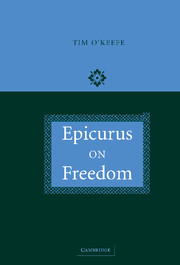Book contents
- Frontmatter
- Contents
- Acknowledgments
- List of abbreviations
- Introduction
- Chapter 1 What sort of an incompatibilist is Epicurus?
- Chapter 2 Lucretius on the swerve and voluntas
- Chapter 3 Aristotle and Epicurus on the origins of character and action
- Chapter 4 Epicurus' reductionist response to Democritean fatalism
- Chapter 5 The swerve and collisions
- Chapter 6 The swerve and fate
- Chapter 7 Epilogue: Epicurus and the invention of libertarian free will
- Appendix: Some texts
- References
- Index
Chapter 1 - What sort of an incompatibilist is Epicurus?
Published online by Cambridge University Press: 22 September 2009
- Frontmatter
- Contents
- Acknowledgments
- List of abbreviations
- Introduction
- Chapter 1 What sort of an incompatibilist is Epicurus?
- Chapter 2 Lucretius on the swerve and voluntas
- Chapter 3 Aristotle and Epicurus on the origins of character and action
- Chapter 4 Epicurus' reductionist response to Democritean fatalism
- Chapter 5 The swerve and collisions
- Chapter 6 The swerve and fate
- Chapter 7 Epilogue: Epicurus and the invention of libertarian free will
- Appendix: Some texts
- References
- Index
Summary
If our sources can be trusted, Epicurus asserts an incompatibility between libera voluntas (sometimes translated as ‘free will’) and determinism, and he denies that determinism is true, positing a mechanism, the swerve, by which it is rendered false, saying that the swerve is needed in order for us to be free. Because of this, Epicurus has been hailed as the first person to discover the free will problem. But this is too hasty. Much of the recent discussion of Epicurus has been muddled by assimilating his position and his concerns to those of modern libertarians. Before we answer the question of how the swerve is supposed to secure our freedom, at least two other questions need to be addressed: What type of freedom is the swerve supposed to secure? And why should we care about having freedom in this sense – that is, why does it matter? Only if Epicurus is concerned to secure the same type of freedom as are modern libertarians, and for the same sort of ethical concerns, are we justified in calling Epicurus a ‘libertarian.’ Before considering in detail the passages in which Epicurus' theory of freedom and the role of the swerve are discussed, in this chapter I will lay some conceptual groundwork that I hope will clarify the following discussion. First, I will set forth (rather schematically) some varieties of ‘problems of free will,’ and I will situate interpretations of Epicurus, including my own, in terms of these varieties.
- Type
- Chapter
- Information
- Epicurus on Freedom , pp. 10 - 25Publisher: Cambridge University PressPrint publication year: 2005



